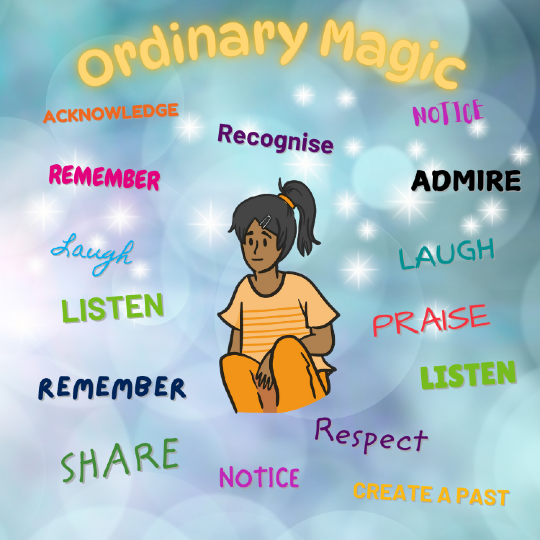Ordinary Magic
Ann Masten (2013) describes the process of building resilience as ‘Ordinary Magic’ because to build resilience all children need are the right environments, the right relationships and the right chances to be able to safely explore themselves and the world around them.
Ordinary Magic
Sometimes the idea of being able to support the resilience and wellbeing of our C&YP in schools feels daunting or, even - giving the pressures schools are under, an imposition.
The joy of some of the most effective things that school staff can do is that they are (as Ann Masten so brilliantly describes them) 'Ordinary Magic'.
Ann Masten's concept of "ordinary magic" is about the everyday, seemingly small things that can create big changes in children's lives. These 'ordinary magic' interactions actions are like tiny spells that build resilience, a child's ability to bounce back from challenges.
Here are some examples of how school staff can practice "ordinary magic" to foster felt safety and belonging:
-
Small Talk and Listening: A simple "hello" or asking about a student's weekend shows you care. Really listening to their answers, even if it's just for a minute, helps them feel seen and heard.
-
Encouragement: A quick high five or a specific compliment ("I love how you explained that idea!") can boost a child's confidence.
-
Small Acts of Kindness: Offering a helping hand, sharing a smile, or a positive note can brighten their day.
-
Creating a Welcoming Space: Making sure the classroom or school feels safe and inviting, with comfortable spaces and clear rules / boundaries, helps children feel at ease.
-
Celebrating Successes: Acknowledging both big and small achievements, whether it's a good piece of work or a kind act, shows students that their efforts matter.
These everyday actions, though seemingly small, can have a powerful impact on children's well-being. They help create a positive and supportive environment where children feel safe, valued, and have a sense of belonging, which are essential for their growth and development.
This is why supporting wellbeing works best as a whole school approach that is 'Everybody's Business'.
-
"Ordinary Magic: Resilience in Development" by Ann Masten: This is the foundational text on the subject, providing a comprehensive overview of resilience research and how "ordinary magic" operates in children's lives.
"Evidence strongly suggests ... that resilience is common and typically arises from the operation of basic protections. There are exceptional cases, where children overcome heavy odds because of extraordinary talents, luck, or resources, but most of the time, the children who make it have ordinary human resources and protective factors in their lives. Resilience emerges from commonplace adaptive systems for human development, such as a healthy human brain in good working order; close relationships with competent and caring adults; committed families; effective schools and communities; opportunities to succeed; and beliefs in the self, nurtured by positive interactions with the world".
Professor Tim Brighouse's 20 things...
When Professor Sir Tim Brighouse died in December 2023 there were many, many tributes. A lot of the articles / posts on social media included his list of '20 things that teachers do...' which outlined the sorts of things good teachers instinctively do each day. They are not exclusive to teachers and they are very much in the spirit of 'Ordinary Magic'.
They include the cheerful ‘good morning’ , celebrating the child has made it and making them feel welcome, through finding and connecting with the ‘invisible pupil’, nicking the odd crisp from the pupils in the playground, remembering a birthday or special event, having a shared interest in football teams or pop stars or... and having a laugh...

